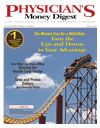Publication
Article
Perspectives from the office & beyond: Where Did All Those Pens Go?
Author(s):
If you're like me, you collect a lotof pens in the office. And yet, youmay be strangely unable to find apen when you need one. You pullout that script pad and reach into yourshirt pocket?no pen. Hmmm. Lookon the counter. No pen. Look in thedrawer. No pen. Strange?I couldswear I put a handful of pens in therethe other day for emergencies like this.It has always been a mystery whythings disappear, but this particularmystery was recently solved when oneof my patients came in with literally ashopping bag full of pens and othersmall office items.
Diagnosis: Kleptomania
He was a middle-aged man, disabledby asthma and mental problemswho lived with his mother. They wereboth very likeable people, smiled a lot,and always chatted amiably with thestaff. They would thank us for ourhelp, send us cards on holidays, complimentus about our appearance, andbrag about our professional skill totheir friends. In spite of the fact thattheir problems seemed intractable andwe lost money taking care of thembecause he was on Medicaid and shewas on Medicare, we were always gladto see them. I had recently put this manon some new psychotropic medswhich, along with liberal doses ofTLC, were starting to help his numerousanxieties and psychosomaticsymptoms. Now, as he stood therewith the bag of pens, he confessed thathe was starting to feel guilty aboutrelieving us of these small but utilitarianobjects and decided to makeamends by returning the stolen stuff.He then told me why he did it, and itwas a very interesting story.
It seems he had a compulsion topick up pens and other small objects"of little value" from counters, mostlywhile he was in doctors' offices. Hehad been cleaning me out of pens, notepads, Neosporin packets, band-aids,and alcohol wipes for years. He did thesame with the various specialists hesaw and loved to accompany his motheron her specialty appointments forthe same reason.
But there was more. He wasn't simplya minor kleptomaniac. It seemsthat the desire to accumulate smallobjects was genetic. He and his motherwere in competition to see whocould accumulate the most objects. Hismother preferred not to physicallysteal things, but had figured out howto get others to pay for a lot of whatshe wanted. She called herself a"hoarder." Her specialty was gettinginsurance companies to pay for herhoard. She had discovered that, withthe right story and with the knowledgeof how her insurance company anddoctors' officesoperated, shecould alwaysget more medicinesand suppliesthan she reallyneeded. She wouldhoard the excess. She had boxes andboxes of unused medications, diabeticsupplies (even though she had beenonly temporarily diabetic years ago),nebulizer equipment (even though herson's asthma had been inactive foryears), and postoperative supplies suchas bandages, latex gloves, and Dependsadult diapers.
A Mother/Son Act
At the end of the day, mother andson would sit around their apartmentand compare who had the most stuff. Ifone was unhappy that the other onehad a bigger supply, he or she might beat a doctor's office the next day to pickup more or get to work on the phonewith doctors' receptionists, pharmacists,and insurance companies.
This explained a lot. For example,this revealed why:
•She and her son always cametogether to the office. She to get herscript and he to empty out my penstash. This way, each could also keepan eye on what the other was doing.Besides, Medicaid paid for his cab rideand she rode free with him.
•She was chronically running outof pills early and needing anotherscript. Funny, how when she brought"all her pills" with her, I would see twoor three bottles of the same drug fromdifferent pharmacies.
•Prescriptions for supplies alwaysseemed to get lost, pharmaciesgot scripts mixed up, and insurancerules required a "new" prescription.
•She always seemed to need themaximum dose of everything I prescribed.A pill cutter could beused to make it a normal doseand the leftover pills couldbe hoarded.
•She often calledon weekends whenother doctors werecovering to ask fora few more pills toget her through the holiday. The medsshe asked for were minor medicationsof little or no street value, and my coveringdoctors, tired of having to say"no" so often to drug seekers, wereglad to be able to say "yes" to a seeminglyinnocuous request from a gracious,sweet old lady who had somehowmixed up her prescriptions.
The whole thing could have beenvery upsetting. There was at least thesemblance of insurance fraud goingon here. But, both mother and sonseemed contrite and embarrassedabout their activities. They promisedto cease their accumulating ways, andthey continued to be incredibly nice.We still love to see them coming. But,of course, we now count all her pills,don't prescribe on the phone, warnthe other doctors, and just say "no" to any suspicious requests. Since Idon't inventory the minor stuff inwaiting rooms, I may never know ifhe backslides. But, the next time Ireach for a pen and it's not there,guess what will cross my mind?
This special feature serves as a forum for our physician-readers to share
their stories. Oftentimes, we find that some of the most inspirational and
informative articles we print come from doctors in the field who invite us to
share their experiences. For this reason, we dedicate this page to the
exchange of these true-life stories.
We welcome doctors to send us tales from their practice (eg, a unique patient,
a staff crisis, etc), their financial planning (eg, handling a
windfall, surviving a scam, etc), their personal life (eg, family stories, interesting
hobbies, etc), and their adventures (eg, an exotic trip, a personal discovery, etc).
Please limit articles to 1000 words and share photos if possible. Send submissions
to Attn: Lisa A. Tomaszewski, Ascend Media Healthcare, 103 College
Road East, Princeton, NJ 08540 or ltomaszewski@ascendmedia.com.
